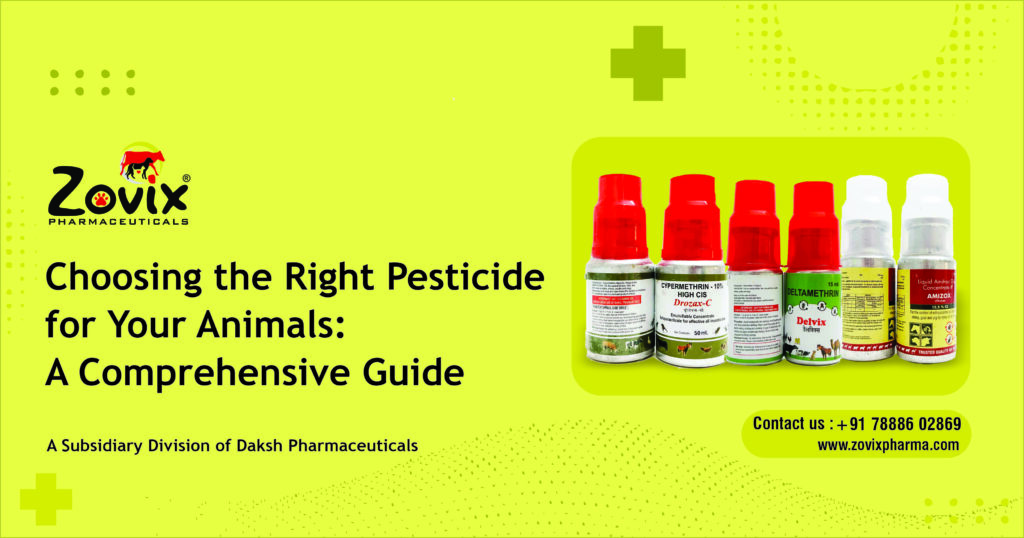When it comes to maintaining the health and well-being of your animals, pest control is an essential aspect that cannot be overlooked. Pests like ticks, fleas, lice, and mites not only cause discomfort but can also lead to serious health issues, including the transmission of diseases. Selecting the right pesticide is crucial for effectively managing these pests while ensuring the safety of your animals. In this guide, we’ll walk you through the key factors to consider when choosing a pesticide, offer safety precautions, and provide best practices for application.
1. Understanding the Type of Animal
Different animals have different sensitivities, and not all pesticides are suitable for every species. Here’s a breakdown:
- Livestock (Cattle, Sheep, Goats): These animals often face challenges from pests like ticks, lice, and mites. Choose a pesticide that is specifically formulated for use in livestock, ensuring it targets the specific pests common to them.
- Pets (Dogs, Cats): Pets can be particularly sensitive to certain chemicals. For household pets, opt for pesticides labelled as safe for use on dogs or cats. Avoid using livestock pesticides on pets, as the concentration may be too strong.
- Poultry (Chickens, Turkeys): Poultry requires a different approach due to their unique physiology. Use pesticides labelled for poultry use and effective against mites and lice that commonly infest birds.
2. Identifying the Pest
The effectiveness of a pesticide largely depends on its ability to target the specific pest affecting your animals. Here’s how to match the pest with the appropriate pesticide:
- Ticks and Fleas: Look for pesticides that specifically list ticks and fleas on their label. These products often contain active ingredients like fipronil or permethrin, which are effective against these pests.
- Mites: Mites require targeted treatment, often with products containing amitraz or pyrethrins. Ensure the pesticide is formulated to eliminate the specific type of mite affecting your animals.
- Lice: Lice infestations in animals can be controlled with pesticides containing insect growth regulators (IGRs), which prevent the lice from maturing and reproducing.
3. Safety Precautions:
Using pesticides safely is paramount to protecting your animals and the environment. Here are some key precautions:
- Read the Label: Always follow the manufacturer’s instructions and warnings on the pesticide label. Pay attention to dosage, application methods, and any restrictions regarding the animal’s age or health condition.
- Wear Protective Gear: When applying pesticides, wear protective clothing, gloves, and, if necessary, a mask to avoid inhalation of fumes or contact with skin.
- Avoid Over-Application: More is not better when it comes to pesticides. Over-application can lead to toxicity and harm your animals. Stick to the recommended dosage.
- Keep Animals Away During Application: To prevent accidental ingestion or inhalation, keep animals away from treated areas until the pesticide has dried or settled as per the label instructions.
4. Best Practices for Application
Effective application is key to ensuring the pesticide does its job without causing harm:
- Spot Treatment: For pets, consider spot-on treatments that are applied directly to the skin in a small area. This method ensures the pesticide is absorbed effectively without exposing the entire body to the chemicals.
- Environmental Control: Treat the environment as well as the animal. Pests often live in bedding, cages, and surrounding areas, so it’s important to apply pesticides to these areas to prevent re-infestation.
- Regular Monitoring: After applying the pesticide, monitor your animals regularly for any adverse reactions, such as skin irritation, lethargy, or changes in behaviour. If you notice any issues, contact a veterinarian immediately.
5. Our Recommended Solutions
at Zovix Pharmaceuticals, we offer a range of veterinary pesticides tailored to meet the specific needs of different animals and pests:
- Delvix (Deltamethrin): Ideal for livestock, this powerful formula targets ticks and mites, providing long-lasting protection. For the prevention and control of ectoparasitic infestations like ticks, mites, lice & fleas in cattle, camel, sheep, goat, and pet animals by spray or dip treatment
- Amizox (Amitraz): Perfect for household pets, this easy-to-apply spot treatment eliminates fleas and prevents re-infestation.
- DROZAX – C (Cypermethrin): It is effective against a broad spectrum of pests that commonly affect animals, including ticks, fleas, mites, and lice. Cypermethrin is versatile and effective for controlling a variety of pests across many animal species. However, it is crucial to use species-specific products and adhere to recommended dosages and application methods to ensure the safety and well-being of the animals. If in doubt, consulting a veterinarian is always the best course of action.
- DROZAX – F (Flumethrin): Flumethrin is a pyrethroid insecticide. It is used externally in veterinary medicine against parasitic insects and ticks on cattle, sheep, goats, horses, and dogs, as well as for control of parasitic mites in honeybee colonies.
Each product is backed by extensive research and is formulated to provide maximum efficacy with minimal risk. For more information on our products or to get personalized recommendations, visit our website ZovixPharma/Pesticide
or contact our customer support team. Call us at +91 9356560523 or email us at enquirypurchase.daksh@gmail.com
Conclusion
Choosing the right pesticide is a critical step in maintaining the health and comfort of your animals. By considering the type of animal, identifying the pest, and following safety precautions, you can effectively manage pests while ensuring the well-being of your animals. Trust Zovix Pharmaceuticals for reliable, effective solutions that keep your animals safe and pest-free.



